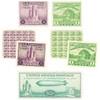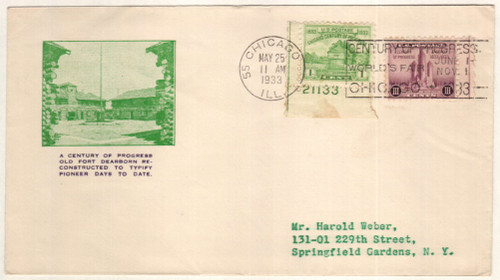
# 728//C18 - Century of Progress, collection of 5 stamps and 2 souvenir sheets
Century Of Progress World’s Fair
The 1933 World’s Fair opened in Chicago, Illinois, on May 27, 1933.
By the late 1920s, the city of Chicago was looking toward 1933 as it’s 100th anniversary. A nonprofit corporation, A Century of Progress, was founded in 1928 to plan and host the upcoming World’s Fair to be held there.
The city allotted three-and-a-half miles of land along Lake Michigan to serve as the fair grounds, which encompassed a total of 427 acres. Because the land was owned by the state, the fair’s architects were pleased to not have to follow Chicago’s strict building codes and were able to experiment with new building materials and techniques. They were also encouraged to explore new building designs, rather than re-creating classic architecture, which had been done in past fairs. The resulting buildings were modern and colorful, dubbed a “Rainbow City.”
Two of the main features on the Chicago Exposition grounds were meant to provide a contrast by which to measure the city’s progress. A restoration of Fort Dearborn, the original site of Chicago, which had twice been destroyed, stood in sight of the towering Federal Building, which dominated the grounds.
The fair opened on May 27, 1933, and was an immediate success. An estimated 15,000 to 20,000 people attended the first day alone. And that night they were treated to a special event. At 9:15, light rays from the distant star Arcturus were pointed to photoelectric cells at several observatories and converted into electrical energy to provide light at the fair.
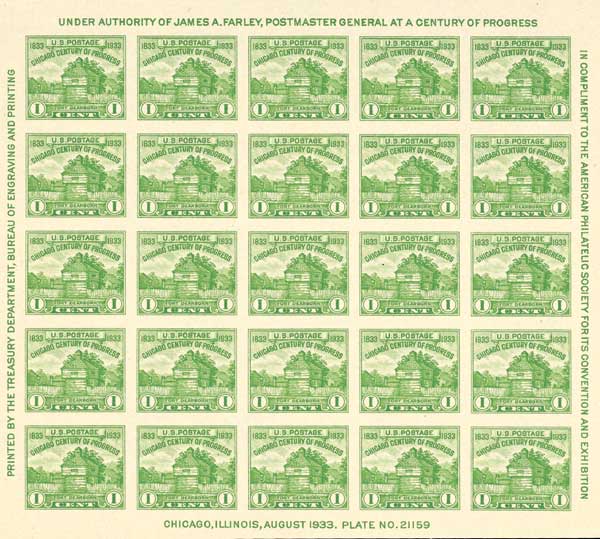
Over the course of the fair, visitors enjoyed a number of exhibits and performances, including one from fan dancer Sally Rand. There was also a Midway containing nightclubs where future stars Judy Garland, The Cook Family Singers, and The Andrews Sisters performed. Guests were also treated to a visual history of Chicago.
Automobiles were another big attraction. Cadillac introduced its V-16 limousine, Lincoln unveiled its rear-engine concept car, and Pierce-Arrow displayed its futurist Pierce Silver Arrow with the catch phrase, “Suddenly it’s 1940!” However, Packard won best in show with its Dietrich-designed Sport Sedan that was called “The Car of the Dome.”
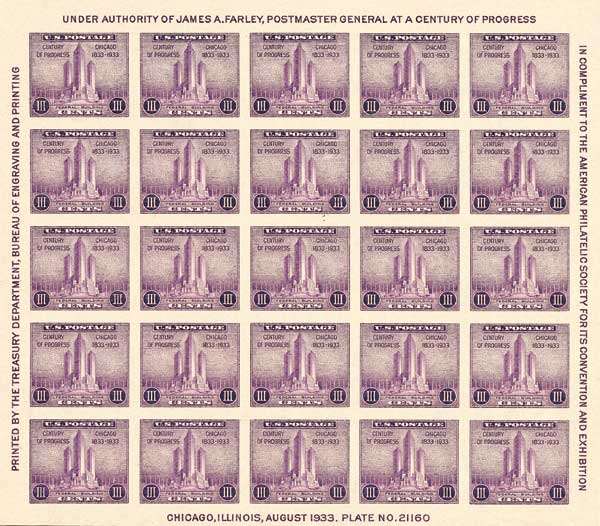
Visitors were also treated to the Homes of Tomorrow Exhibition, which showcased new ideas in architecture and design, as well as new building materials. Many of the homes adopted the art deco or other modern design aesthetic at the time. Many firms used the opportunity to display the capabilities of pre-fabricated homes. New home furnishings were also unveiled, most notable, the personal helicopter pad.
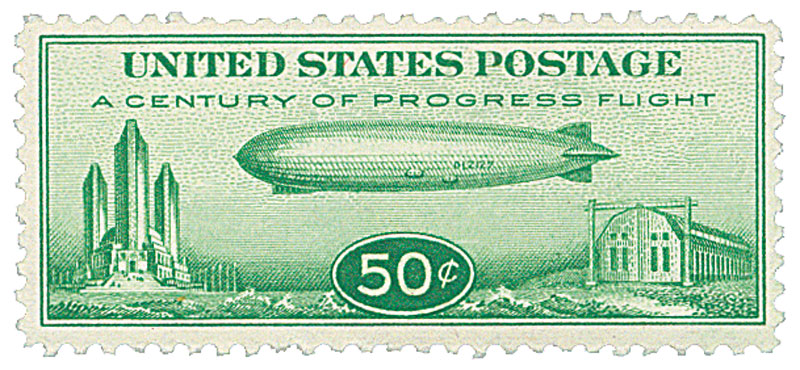
That July, the first Major League All-Star Game was held in conjunction with the fair at nearby Comiskey Park, home of the Chicago White Sox. In the end, the American League defeated the National League 4 – 2 in the two-hour game. Around 49,200 people were in attendance.
One of the most popular events during the course of the fair was the arrival of the German Graf Zeppelin on October 26, 1933. The Zeppelin circled the air over the expo for two hours before a brief 25-minute landing, and then took off for Akron, Ohio.
The fair was initially supposed to end in November 1933. However, it had stimulated consumer spending during the Great Depression, so President Roosevelt encouraged its organizers to open again for a second year the following May. During that second year, Henry Ford (who’d refused to participate the first year but changed his mind seeing the success of his competitors) had one of the most popular corporate attractions. Another highlight of the 1934 fair was the exhibition of the Union Pacific Railroad’s M-10000 and the Burlington Route’s Pioneer Zephyr. In fact, on May 26, the Zephyr completed a record-breaking 13-hour, five-minute run from Denver to Chicago, reaching the fair’s stage during the “Wings of a Century” transportation presentation.
By the time the fair closed, more than 48 million people had attended. It was the first international fair to pay for itself, thanks in part to the sale of bonds prior to its opening.
Century Of Progress World’s Fair
The 1933 World’s Fair opened in Chicago, Illinois, on May 27, 1933.
By the late 1920s, the city of Chicago was looking toward 1933 as it’s 100th anniversary. A nonprofit corporation, A Century of Progress, was founded in 1928 to plan and host the upcoming World’s Fair to be held there.
The city allotted three-and-a-half miles of land along Lake Michigan to serve as the fair grounds, which encompassed a total of 427 acres. Because the land was owned by the state, the fair’s architects were pleased to not have to follow Chicago’s strict building codes and were able to experiment with new building materials and techniques. They were also encouraged to explore new building designs, rather than re-creating classic architecture, which had been done in past fairs. The resulting buildings were modern and colorful, dubbed a “Rainbow City.”
Two of the main features on the Chicago Exposition grounds were meant to provide a contrast by which to measure the city’s progress. A restoration of Fort Dearborn, the original site of Chicago, which had twice been destroyed, stood in sight of the towering Federal Building, which dominated the grounds.
The fair opened on May 27, 1933, and was an immediate success. An estimated 15,000 to 20,000 people attended the first day alone. And that night they were treated to a special event. At 9:15, light rays from the distant star Arcturus were pointed to photoelectric cells at several observatories and converted into electrical energy to provide light at the fair.

Over the course of the fair, visitors enjoyed a number of exhibits and performances, including one from fan dancer Sally Rand. There was also a Midway containing nightclubs where future stars Judy Garland, The Cook Family Singers, and The Andrews Sisters performed. Guests were also treated to a visual history of Chicago.
Automobiles were another big attraction. Cadillac introduced its V-16 limousine, Lincoln unveiled its rear-engine concept car, and Pierce-Arrow displayed its futurist Pierce Silver Arrow with the catch phrase, “Suddenly it’s 1940!” However, Packard won best in show with its Dietrich-designed Sport Sedan that was called “The Car of the Dome.”

Visitors were also treated to the Homes of Tomorrow Exhibition, which showcased new ideas in architecture and design, as well as new building materials. Many of the homes adopted the art deco or other modern design aesthetic at the time. Many firms used the opportunity to display the capabilities of pre-fabricated homes. New home furnishings were also unveiled, most notable, the personal helicopter pad.

That July, the first Major League All-Star Game was held in conjunction with the fair at nearby Comiskey Park, home of the Chicago White Sox. In the end, the American League defeated the National League 4 – 2 in the two-hour game. Around 49,200 people were in attendance.
One of the most popular events during the course of the fair was the arrival of the German Graf Zeppelin on October 26, 1933. The Zeppelin circled the air over the expo for two hours before a brief 25-minute landing, and then took off for Akron, Ohio.
The fair was initially supposed to end in November 1933. However, it had stimulated consumer spending during the Great Depression, so President Roosevelt encouraged its organizers to open again for a second year the following May. During that second year, Henry Ford (who’d refused to participate the first year but changed his mind seeing the success of his competitors) had one of the most popular corporate attractions. Another highlight of the 1934 fair was the exhibition of the Union Pacific Railroad’s M-10000 and the Burlington Route’s Pioneer Zephyr. In fact, on May 26, the Zephyr completed a record-breaking 13-hour, five-minute run from Denver to Chicago, reaching the fair’s stage during the “Wings of a Century” transportation presentation.
By the time the fair closed, more than 48 million people had attended. It was the first international fair to pay for itself, thanks in part to the sale of bonds prior to its opening.



